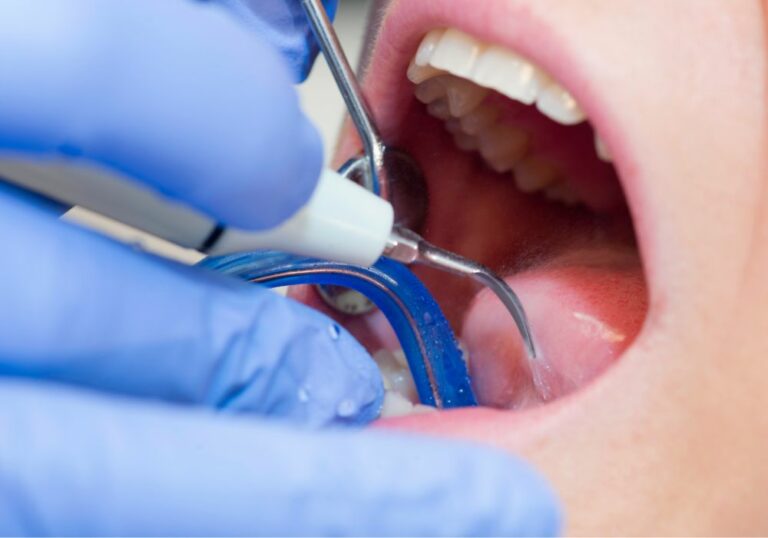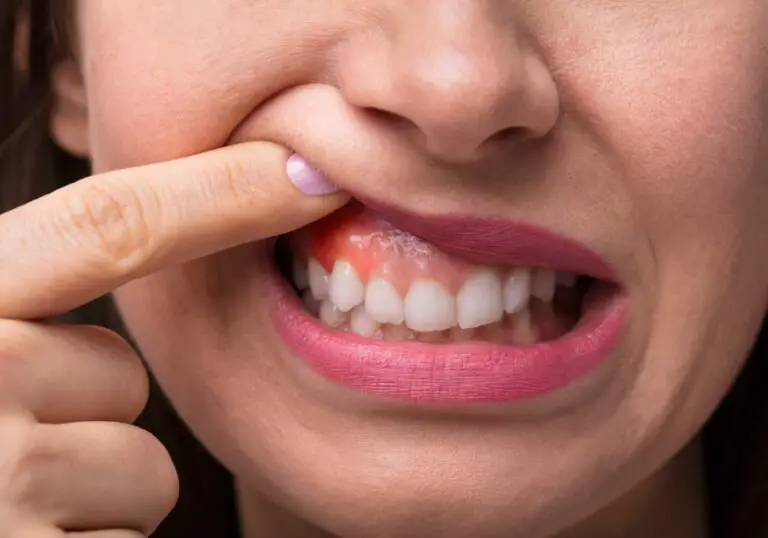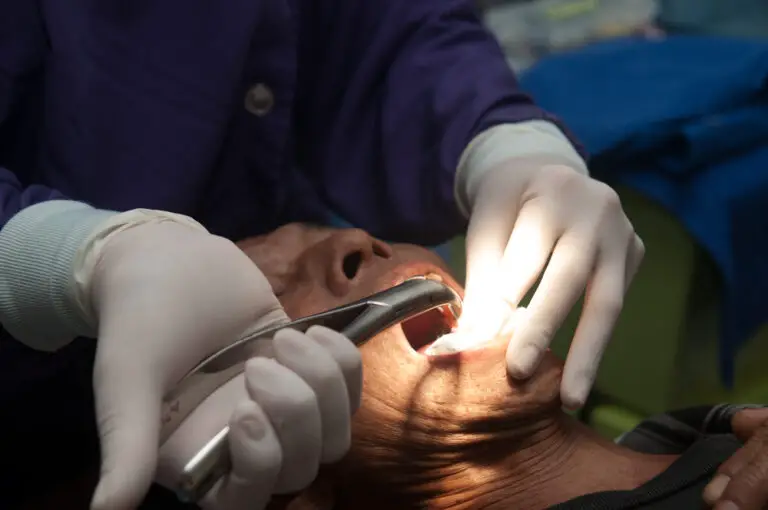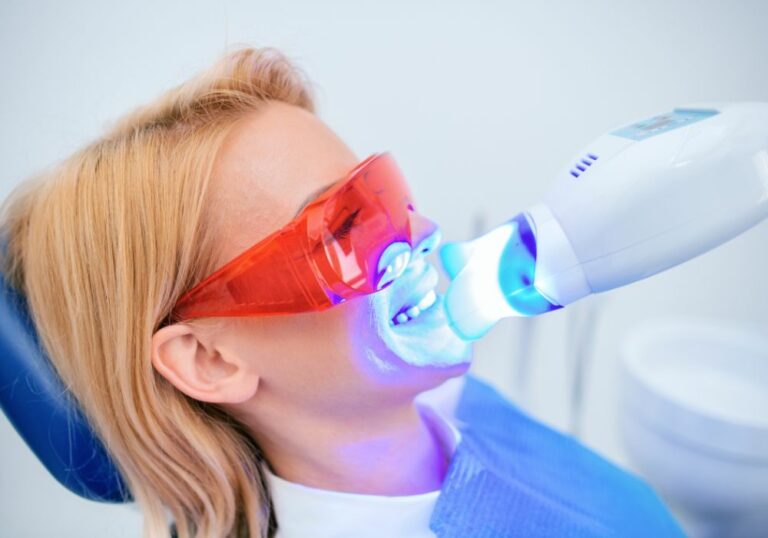Gold teeth have long been seen as a symbol of prestige, status, and wealth. While dental trends have moved away from obvious gold teeth in recent decades, gold tooth caps on the canines or front teeth remain popular in certain circles – especially hip hop culture and rap artists. But how much does it actually cost to get a gold tooth cap installed on your canine?
The prices for gold canine teeth can vary quite a bit depending on several factors:
Type of Gold Used
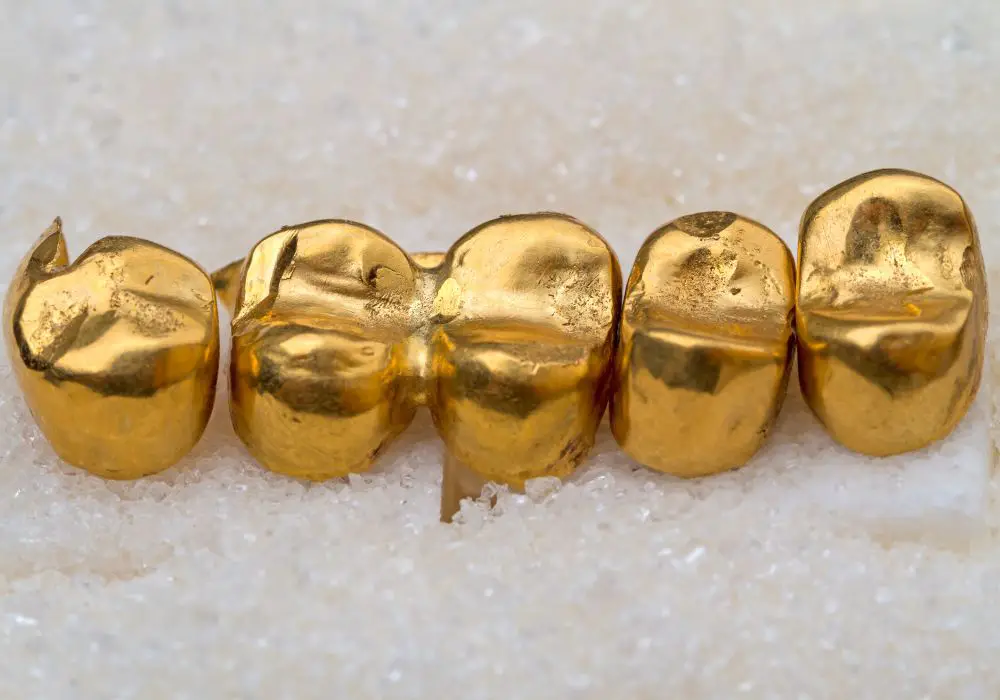
- 24K gold – This is pure gold with no other metals mixed in. It has a bright yellow color and is the most expensive option, but too soft for dental use.
- 18K gold – 18 karat gold contains 75% pure gold mixed with other metals like silver, copper, and zinc. It has a richer yellow color and is a common choice.
- 14K gold – 14K gold contains 58% pure gold and is mixed with more base metals. This strongest gold alloy is most commonly used for dental restorations. It has a lighter yellow hue.
- 10K gold – 10 karat gold has 41% pure gold content, with more silver and copper replacing it. It has an even lighter yellow and is more affordable, but not always offered.
- Gold electroplated metal – This is a base metal like stainless steel with a coating of gold on the surface for appearance. Not commonly used for dental restorations.
Clearly the higher the karat of real gold used, the greater the cost per ounce. 24K is not suitable for teeth, while dental gold alloys of 14K and 18K provide an ideal combination of rich yellow color, strength, and durability.
Amount of Gold Required
The amount of gold needed to make your tooth cap will impact the price:
- Gold overlay – This has a shell of gold covering the visible portion, but uses a composite or porcelain-metal mix underneath for strength. Less gold is needed, reducing cost.
- Solid gold – A solid gold tooth requires more gold compared to an overlay, increasing the price. It has optimal longevity, but comes at a premium.
- Multiple teeth – Bridgework replacing several teeth takes more gold and is more complex, meaning higher cost.
Design Complexity
Simple gold teeth with smooth, uniform coverage are quicker and easier for the dentist to fabricate. More complex designs take more time and artistic skill, increasing what you pay:
- Simple shape – Basic tooth shape replacement with gold has minimal design time.
- Intricate carvings – Hand engraved scrollwork, symbols, lettering, or patterns takes much longer to create.
- Diamond/gem accents – Adding precious gems or stones into the gold for sparkle is a premium upgrade.
- Platinum bands – Integrating decorative platinum bands into the gold design adds complexity and cost.
Your Dentist
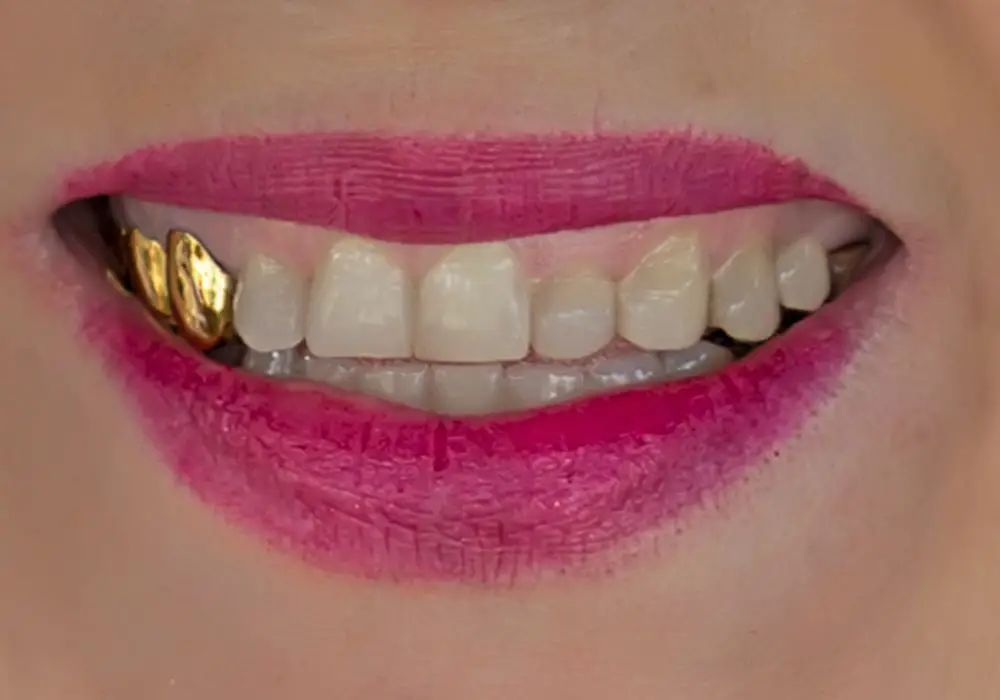
Like most healthcare, dentist fees vary greatly. The same gold tooth could cost vastly different amounts from one dentist to another. Some factors impacting your dentist’s charges:
- Dentist skill level – A dentist very experienced and artistic with gold restorations may charge more.
- Office overhead – State-of-the-art offices have higher expenses passed to patients.
- Geographic location – Urban and coastal areas tend to have the highest dental fees overall.
- Reputation and demand – Highly sought-after dentists can demand top dollar. Newer dentists may charge less.
When getting quotes, make sure you understand exactly what is included to compare apples-to-apples between different dentists.
Estimated Gold Tooth Cost Ranges
With all those factors in mind, here are some typical price ranges you can expect:
- Gold overlay canine – $300 to $600
- 14K or 18K solid gold canine – $800 to $1,500
- Fancy engraved solid gold canine – $1,000 to $2,000
- Multiple tooth bridge – $2,000 to $4,000+
Be aware that chewing stress puts more force on canine teeth. So damages or remakes down the road could incur additional costs over time.
For maximum longevity, choosing an experienced dentist skilled with gold restorations is advisable, even if their prices are somewhat higher. A discount dentist who rushes the process risks problems that could end up costing you more to fix down the road. This is definitely one area where getting what you pay for matters.
The Process to Get a Gold Tooth
Getting a real gold tooth is a multi-step process requiring careful planning and execution:
Initial Exam and Planning
Your dentist will examine your tooth and overall oral health to decide if you are a candidate for a gold canine cap or crown. They determine the design, gold type, prep needed, and approximate costs.
Tooth Preparation
The natural tooth is shaped and contoured to fit inside the dimensions of the planned gold crown. Your dentist removes any decay and creates room for the gold cap thickness.
Impressions and Lab Work
Molds of your prepped tooth are taken and sent to a dental laboratory. They fabricate a model of your actual tooth to create the gold crown or cap to your dentist’s specifications.
Gold Tooth Delivery
2-3 weeks later, your dentist receives the final custom gold tooth/teeth from the lab for you. They have you try it in to ensure proper fit and comfort.
Tooth Bonding Appointment
At a followup visit your tooth is finally ready for bonding! The gold cap is permanently cemented onto your natural tooth. Your new smile is complete.
It typically takes 2-4 visits total over 3-6 weeks to complete the gold tooth process, depending on your specific case. Some dentists can do a quality job more quickly, but don’t rush the process – you want your gold tooth to last!
Maintaining Your Gold Canine Tooth
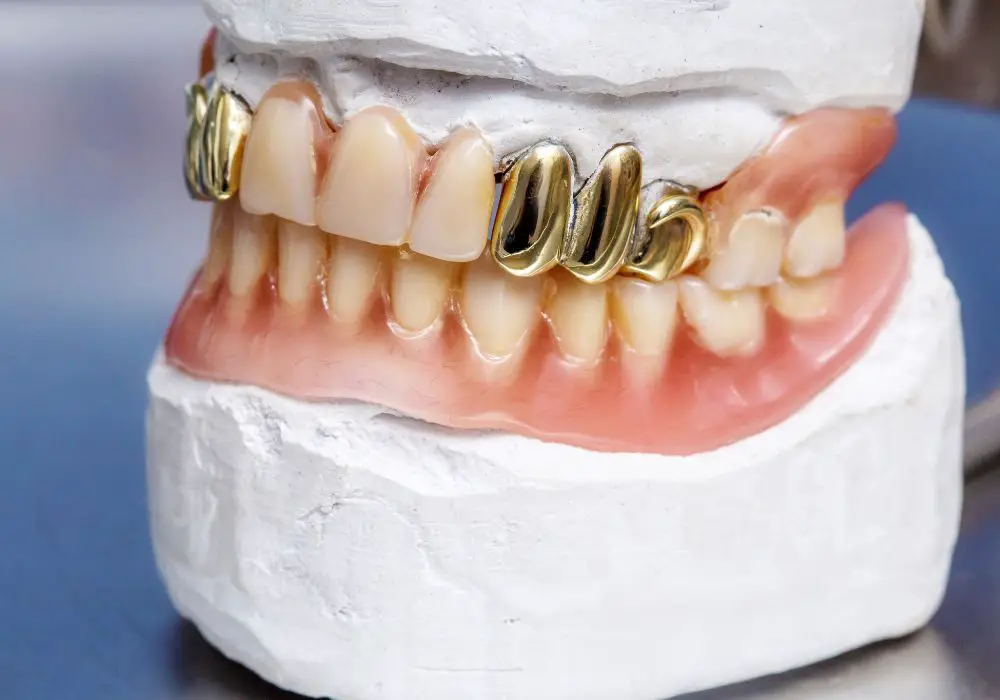
Gold is naturally corrosion resistant and can last over a decade with proper care. But it’s not indestructible. Here are some tips for making your gold tooth last:
- Brush normally twice a day, taking extra care to clean thoroughly along the gumline near gold teeth. The bristles should contact both the tooth and gold surface.
- Floss daily to remove plaque and debris that can get trapped next to gold tooth margins. Consider using interdental brushes for better access between teeth.
- See your dentist for cleanings every 6 months to prevent gum disease and catch any problems early. Have them closely check around your gold tooth margins.
- Wear a nightguard if you grind your teeth to prevent wearing down or fracturing gold teeth during sleep.
- Avoid chewing excessively hard foods like ice, nuts, and hard candies that can damage the gold.
- See your dentist promptly if you notice any loosening, damage, pain, or changes around the gold tooth area indicating a problem. Addressing it quickly can often save your restoration.
Follow your dentist’s recommendations faithfully and your new gold smile could stay beautiful and vibrant for many years to come! Be aware that some maintenance or remake may eventually be needed due to chewing forces on the canines.
Common Gold Tooth Questions
Are gold teeth bad for you?
When properly made and cared for, solid gold alloy is safe, durable and biocompatible for dental use. Ensure good fit and oral hygiene around it.
Do real gold teeth turn black?
Gold itself won’t change color or corrode. But as your gumline recedes over decades, the tooth edge near the gum can look darker. Proper home care and cleanings prevent this “black line” effect.
Can I sleep with gold teeth?
There’s no issue sleeping with properly fitted gold teeth. Many dentists recommend wearing a nightguard to protect your investment from grinding damage or fractures during sleep.
Can I get permanent golds on the NHS?
The NHS does not provide gold teeth for purely cosmetic reasons. But gold may be used on some front teeth if deemed clinically necessary. You may get partial funding support to upgrade to gold. Check with your dentist on options.
Will gold teeth ruin my singing voice?
It can take some adjustment to sing with gold teeth. The different feel and sound conduction can temporarily impact tone and embouchure control. Be patient re-training your vocal technique. Consider removable caps if problems persist.
Conclusion
Gold teeth remain coveted for their artistic style, richness, and symbol of wealth, especially in music and fashion circles. Cost for a gold canine tooth can range from around $300 for a basic overlay, up to $2000+ for an intricate custom engraved solid gold crown with diamonds or gems.
While visually appealing, gold teeth do require dedication to dental hygiene and regular professional care to achieve longevity of 10-15 years or more. Take time to find an experienced dentist and invest in a quality job you’ll be proud to show off for years to come!


